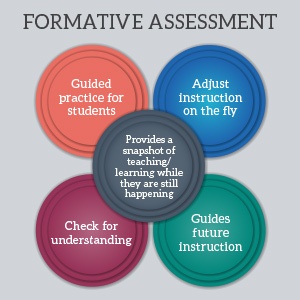Formative assessment is an important tool to take full advantage of, especially in this transitional era of implementing more rigorous standards.
When correctly incorporated into classroom practice, the formative assessment process provides information needed to adjust teaching and learning while they are happening. The process serves as practice for the student and a check for understanding during the learning process. The formative assessment process guides teachers in making decisions about future instruction.
Read More
Topics:
General Education,
Math,
State Standards,
Struggling Students,
Assessment
As we implement higher standards across the country, it has become increasingly important that we identify and use a variety of strategies to assess student learning so that the appropriate interventions may be provided.
One strategy is to encourage students to reflect on their reasoning and justify their work. The idea of justifying your work in mathematics has to go beyond the use of inverse operations to “prove” that the calculation was correct. This way of checking is not justification since it does not address the student’s use of metacognition—the thinking about thinking—that goes beyond the use of an algorithm and takes you into their decision-making processes.
Read More
Topics:
Math,
Common Core,
State Standards,
Common Core Math,
NCTM Standards
Recent conversations in my faculty lounge have drifted to the sentencing of educators in Georgia who were convicted of tampering with test materials. How did people who presumably care deeply about children end up breaking laws and serving prison time?
We as educators are trained to look beyond the results of a failure and analyze the cause. So what happened in Georgia, and is threatening to happen all over the country? Perhaps the problem is that an assessment is being used for purposes beyond its scope. I contend that if we as educators want to improve our discipline’s professionals, we need to use tools that are proven to do just that.
Read More
Topics:
General Education,
State Standards,
Positive Behavior Interventions and Supports,
Assessment
I’d like to take you on another journey along the road of the language of mathematics with a stop at the intersection of “math concepts and symbolic notations.”
Sometimes the mathematics conversation is just as confusing to students as this collection of signs is to a driver in an unfamiliar situation. There appears to be a variety of symbols used to identify the different types of roads in the area, just as we have a variety of concepts, operations, and relations that are conveyed through symbolic notations.
To further complicate the issue, in math we sometimes have a variety of symbols used to convey the same concept or idea. Imagine the student’s dismay when he or she is not familiar with a new symbolic notation that is being used but is familiar (and perhaps proficient) with a different notation. This can certainly be a blow to some students’ math confidence.
Read More
Topics:
Math,
Common Core,
State Standards,
Common Core Math,
NCTM Standards
In my previous blog, I argued for a dual topic approach to curriculum design. The framework outlined in that blog is based on a variety of research.
Some of this research is drawn from psychology and studies of human learning. These involve the development of automaticity and controlling cognitive load. Other design elements are associated with what we have learned over the years from international research, particularly the way successful countries focus on fewer topics with greater depth in their math curricula. Still other research is a synthesis of what we believe are best instructional practices in remedial and special education.
Read More
Topics:
Math,
Common Core,
State Standards,
Common Core Math,
NCTM Standards,
Struggling Students
Defining a High-Standards Math Curriculum for Struggling Students, Part 2 of 2
I made the case in my previous blog that adjusting the pace of instruction for struggling students in a high-standards curriculum is imperative. We all have different aptitudes for a given endeavor—from music to mathematics—and it is unrealistic to expect that all students can learn the same set of complex ideas in the same, fixed period of time.
Adjusting the pace of instruction does not mean that we should teach topics like fractions or integers in “twice the time” as much as it means that we need to sequence carefully the flow of concepts within these topics. It also means trade-offs such as not teaching every standard. There is little reason to believe that every standard is equally weighted in its importance, particularly if time is an issue.
Read More
Topics:
Math,
Common Core,
State Standards,
Common Core Math,
NCTM Standards,
Struggling Students

Defining a High-Standards Math Curriculum for Struggling Students, Part 1 of 2
It takes time for research to be translated into practice, particularly when it comes to textbooks. For example, it was nearly 20 years ago when U.S. math educators examined the textbooks and instructional practices of highly successful countries around the world, only to determine what we already knew. American math textbooks were “a mile wide and an inch deep.” In contrast, international curricula typically contained fewer topics that were addressed in greater depth.1
The traditional structure of math textbooks as you move across the grade levels has been unfortunately predictable. James Flanders’ analysis of elementary and middle school texts in the late 1980s characterized the typical text as bloated with all kinds of review and extra content.2 Almost 30 years later, we still have the same problem in many of our math textbooks.3 This problem remains in spite of the fact that efforts like the National Council of Teachers of Mathematics (NCTM) standards to infuse more conceptual understanding and problem solving in textbooks occurred in the intervening years.
Read More
Topics:
Math,
Common Core,
State Standards,
Common Core Math,
NCTM Standards

Have you ever wondered why it is so difficult to teach mathematics and why it is so difficult for students to grasp the meaning of the words we use in mathematics? If you pause and think about it, mathematics is a very technical subject, and it has a set of vocabulary words that have very precise meanings and sometimes multiple uses within mathematics. Outside of the math class, those same words take on a whole different meaning—oops, there is one of those words: “whole.” Get it?
Well, there are lots of them, and I would like for you to take the seat of the students for a few minutes as you read this and filter the conversation through their ears.
Read More
Topics:
Math,
Common Core,
State Standards,
Common Core Math,
NCTM Standards

One of the biggest impacts of the No Child Left Behind (NCLB) legislation has been the infusion of the word “research” into the language and thinking about education. Teachers are encouraged to ask, “Is my classroom curriculum research based?” “What about specialized interventions for students with disabilities?” It is a short step to asking the same question about today’s mathematics standards, and prominent researchers at Vanderbilt University have done just this in a series of randomized control studies.1
What the researchers described as “very low achieving” fourth grade students were randomly assigned to either inclusive or specialized intensive classrooms. Instruction in both conditions was guided by grade-level standards for fractions. It wasn’t a major surprise that the students in the inclusive classrooms performed poorly over the three years of the study as teachers fully implemented the Common Core State Standards. Researchers, however, were dismayed to find that the performance of students in specialized intensive settings also decreased over time, despite the use of their intervention curriculum in these studies.
Read More
Topics:
Math,
Common Core,
State Standards,
Common Core Math,
NCTM Standards

Debates over math standards, whether they are the NCTM Standards or the Common Core Math Standards, often spill into the question, “What do they mean for struggling students?” There are many issues behind this question, not the least of which is the exceedingly heterogeneous group of students frequently called “struggling.” Unpacking that issue alone is an essay in itself. For our purposes, what standards mean for struggling students can be distilled into at least two basic questions:
- Are high standards appropriate for struggling students?
- If they are not appropriate, are they even relevant?
Read More
Topics:
Math,
Common Core,
State Standards,
Common Core Math,
NCTM Standards











